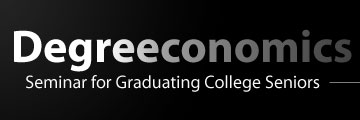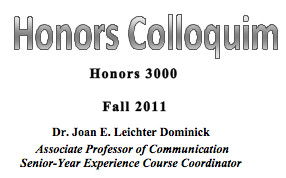Honors 3000/01 Syllabus: Fall 2011
Honors 3000/01 Syllabus: Fall 2011
Department of University Studies
Office: LB 417
Office Hours: By appointment
Phone number: (770) 423-6356
Email address: jdominic@kennesaw.edu
Faculty Web Folio: http://joandominick.com
Course Website: http://degreeconomics.com/?page_id=132
Course Meeting Times:
Honors 3000/01: Meets Every Other Friday 11:00am- 12:40pmpm Library 430
Colloquium Description:
Using Neo-Aristotelian Rhetorical Theory as a backdrop for exploring what it means to be a college graduate 2.0, we will review the current literature on graduating in a web 2.0 world, examine why developing a digital presence is critical for one’s career, pursue strategies for developing a digital presence, and explore the personal and professional morphing of digital presence and its subsequent implications.
Will satisfy one Honors Colloquium requirement.
PREREQUISITE: ADMISSION TO KSU’S HONORS PROGRAM. STUDENTS NEED HONORS OFFICE APPROVAL TO REGISTER
Honors 3000: Grading Process & Course Components
1 hour credit; PASS/FAIL
Tentative Course Schedule posted n Georgia VIEW Vista and is subject to change
Grading Process: (500 possible points may be earned):
Passing Grade: 500 points to 300 points earned
Failing Grade: 299 Points earned or below
Grade Components:
• Seven discussion board posts (50 points each – Total of 350 points)
• Two Assignments (75 points each – Total 150 points)
Explanation of Discussions & Assignment:
More details regarding each of these assignments will be given online and in class.
Assignment Posted on Vista & Course Website Degreeconomics:
Assignment One: Using Neo-Aristotelian Rhetorical Theory, develop your strategic plan and storyboard for sharing your story.
Assignment Two: Using Neo-Aristotelian Rhetorical Theory, produce your strategic plan and portfolio for sharing your story.
Range of possible formats for your strategic plan to share your story:
a) Professional Presence using Web 2.0 & Web 1.0
b) Professional Presence using Web 1.0
c) Professional Presence using Web 1.0 (password protected)
d) Professional Presence using Paper Format/Software not online
e) Professional and Personal Presence using Web 2.0 & Web 1.0
f) Professional and Personal Presence using Web 1.0
g) Professional and Personal Presence using Web 1.0 (password protected)
h) Professional and Personal Presence using Paper Format/Software not online
Tentative Course Schedule:
August 19th: Class Meeting
August 26th: Discussion One Due – No Class Meeting
September 2nd: Class Meeting
September 9th: Discussion Two Due – No Class Meeting
September 16th: Class Meeting
September 23rd: Discussion Three Due- No Class Meeting
September 30th: Class Meeting
October 7th: Discussion Four Due – No Class Meeting
October 14th: Class Meeting – Assignment One Due
October 21st: Discussion Five Due – No Class Meeting
October 28th: Class Meeting
November 4th: Discussion Six Due – No Class Meeting
November 11th: Class Meeting
November 18th: Discussion Seven Due – No Class Meeting
December 2nd: Last Day of Class – Assignment Two Due
December 9th: Final Exam Date – No Final Exam: Last day to turn in course work
Course Materials
All Course Material on Georgia WebCt Vista View:
All course materials are found on Georgia VIEW Vista for Honors 3000: http://vista.kennesaw.edu
Recommended Course Activities –KSU Resources:
1. Open a Files.Kennesaw.edu account to store your portfolio content: www.files.kennesaw.edu/
(use your net id & password)
2. Review for new ITS technology training seminars:
ITS Home: http://its.kennesaw.edu/students.htm
ITS Computer Train: https://computertrain.kennesaw.edu/
Course work due dates:
All course work is due on assigned date. Failure to turn in course work on the scheduled date results in late work worth half credit. Exceptions to this will be handled on a case-by-case basis.
Academic Integrity Statement:
Every KSU student is responsible for upholding the provisions of the Student Code of Conduct, as published in the Undergraduate and Graduate Catalogs. Section II of the Student Code of Conduct addresses the University’s policy on academic honesty, including provisions regarding plagiarism and cheating, unauthorized access to University materials, misrepresentation/falsification of University records or academic work, malicious removal, retention or destruction of library materials, malicious/intentional misused computer facilities and/or services, and misuse of student identification cards. Incidents of alleged academic misconduct will be handled through the established procedures of the University Judiciary Program, which includes either an “informal” resolution by a faculty member, resulting in a grade adjustment, or a formal hearing procedure, which may subject a student to the Code of Conduct’s minimum one semester suspension requirement.
Cell Phone Protocol:
Please have cell phones on silent or vibrate in case of emergency notifications





